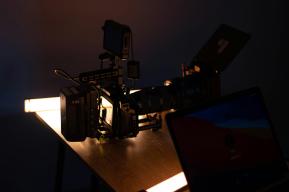Idea
Judith Santopietro: "You can rebuild yourself through writing"

Interview by Laura Berdejo
UNESCO
What role does writing play in your life?
Writing plays a vital role in my life. I came to the United States in 2012, lived in Texas for a few years, then I returned to Mexico. I go back and forth between the two countries. In addition to my own publications, I run literature and writing workshops with women from Mexico's indigenous peoples who live in the United States.
The women who take part in these workshops don't just write as an exercise; it's an opportunity for them to express things that are deeply buried, to put into words experiences that are sometimes very harsh. The aim is not to heal through writing, but rather to use it as a trigger, to initiate a process that leads them to question their identity. This is important for women who live in a country where they didn't grow up, and who recreate a community to protect themselves and to embellish their lives, particularly around food, religious rites or festive moments. For me, this is an important aspect of the story, as it helps to dispel the idea that migration is synonymous with suffering. Moments of pain do exist, of course, but they don't sum up the experience of these women.
Your latest collection of poems, Tiawanaku. Poemas de la madre Coqa, recounts the journey of an Aymara woman – an indigenous population spread across Argentina, Bolivia, Chile and Peru – through the Andes mountains. What's your connection with this character?
Tiawanaku, which is the name of an ancient archaeological city in Bolivia, tells the story of a displaced woman who flees her country, Mexico, in the midst of a war between drug cartels, to reach the Andes. This character is very close to me. I did in fact travel by bus from Lima in Peru to La Paz in Bolivia. The trip took over 30 hours.
I wrote this book at a time when I was unable to distance myself from the violence I had experienced, which is why the narrative is in the first person singular. Today, having taken part in projects on migrants and refugees in Mexico, working with groups searching for missing persons, I know just how important it is to put one's traumas into words. You can rebuild yourself from this experience.
This trip was an opportunity for you to familiarize yourself with Andean cosmogony. How do these languages influence your work?
The Spanish I use rubs shoulders with Quechua, Aymara and other Andean languages. It wasn't a conscious decision on my part, it just happened naturally. During this trip, I was writing non-stop. I recorded everything I saw. I was looking for my place in this world that I was crisscrossing, listening to.
At first, I had trouble understanding the Spanish spoken in the Andes, but I persevered. By listening carefully to this mixed language, I came to realize there were links between the concepts conveyed by Aymara, Quechua and other Altiplano languages. I also realized the extent to which they had permeated Spanish.
Does the revitalization of indigenous languages involve deconstructing the linguistic hierarchy?
A new version of Tiawanaku is about to be published in Mexico. On this occasion, my editor suggested that I italicize words and concepts from other languages. I refused because I didn't want to give the impression of a linguistic hierarchy. I didn't want these terms from other idioms to appear as intruders. Instead, I wanted to show how Andean Spanish was strongly modified, in its very syntax, by the contribution of the indigenous languages that pre-existed it.
Andean Spanish has been strongly modified, in its very syntax, by the contribution of indigenous languages
These languages carry with them a wealth of precious knowledge. Concepts such as quipu, which is a knot or link in Quechua, or ajayu, cosmic energy, express a whole way of seeing the world, animate beings and natural phenomena. I learned this through the oral histories of my village, but thanks to the language. Nahuatl, the language of my ancestors, has words to designate animate beings and distinguish them from those that are not. The same is true of many other indigenous languages. Stones can thus be inhabited, or even endowed with a spirit. In rituals, the terms used refer to divinities, and are pronounced to act and heal.
It took me a long time to understand that the Spanish spoken in my home was totally imbued with Nahuatl. Recognizing the terms hidden within it was like a revelation. The problem is that these languages are now threatened with extinction.
How can we restore the cosmogonies transmitted by native languages?
I think the process of active listening is fundamental. When I design and run writing workshops, usually for a migrant audience, and when I tackle certain themes with vulnerable populations, I use this listening process first and foremost. Writing comes next. It's a way of releasing emotions, of putting them in order.
Writing is a way of releasing emotions, of putting them in order
Listening allows us to access otherness. As well as bringing us face to face with people, it enables us to grasp their concerns and their experiences of migration. We don't take enough time to reflect on the reasons why these people have left their country, or what they have endured during their journey. Through the process of active listening, we can uncover their family stories, show more empathy and better understand the world.
Your work falls somewhere between prose and poetry. What does the poetic form offer you?
For me, poetry is a means of dialoguing with existing cosmogonies. It tears apart reality to let images emerge, giving us a glimpse of the strange and unusual in everyday life.
If we compare it to a work of prose, a novel or a story, poetry opens up unsuspected worlds that we otherwise miss. Prose, on the other hand, allows us to unfold longer narratives.
What advice would you give to those who are starting out as poets?
Just one piece of advice: experience what is elsewhere. You mustn't just be the voice that speaks, but first and foremost the one that listens and observes. You have to know where you want to take your writing, and to whom. When I write, I don't think about the idea of a poem; I ask myself what is my voice in the world and how to direct that light. While it goes without saying that you have to read classical poets and contemporary authors, it's also essential to be open to authors who write in other languages, in order to change your perspective.
I loved reading some of the poets of the indigenous nations of the United States and Latin America: I was surprised by these new ways of conceiving nature, human beings, women, birth, the principle of hope and the struggle for one's territory.
It's also important to remember that not everything has to be published. Active participation in the life of the community, sharing poetry and stories, is important in its own right. Finally, you shouldn't try to use these works or publish them.
What projects are you currently working on?
I'm writing my first novel, and I feel reborn as a writer. It's the story of an indigenous woman – a strong, determined woman who, in the difficult circumstances of migration, takes control of her destiny.
At the same time, I'm writing a book about forced disappearance in Mexico. I want to tell the story of the leading role played by women in the search for information on victims. I want to describe their solidarity and the steps they take, but also their rituals and the difficulties of all kinds they encounter. You could call this book ‘documentary poetry’. Just as I like to write in new places and contexts, I like to experiment with new literary genres.






